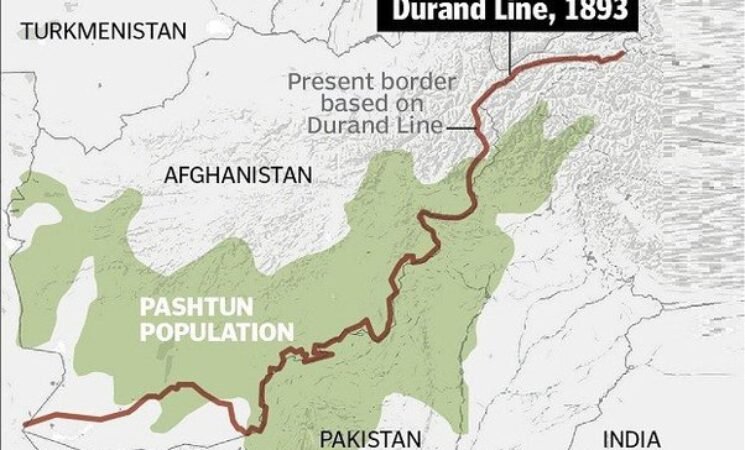21 January 2022, NIICE Commentary 7609
Masom Jan Masomy
Tensions in crossing points along the Durand Line have become an everyday issue between Afghanistan and Pakistan. This is because the public opinion of Afghans towards Pakistan has been more raged and hated on account of the latter’s illicit policy against the former for years. Closing gates and installing numerous barriers to restrict Afghan passengers; stopping Afghan commercial goods either inside Pakistan or ‘crossing points’ for a long duration; encroachment of Afghan soil across the Durand Line, and firing series of mortars on eastern provinces of Afghanistan such as Kunar and Nangarhar by Pakistan are the issues leading to tensions between the two countries.
The recent provocative actions between the Taliban and Pakistan in several locations on Durand Line have triggered new debates about the fate of Durand Line and the relations of the Taliban and Pakistan. The removal of barbed wire and warning to Pakistani border troops by the Taliban military is something new. However, Pakistan attempted to solve the tensions through diplomatic approaches with the Taliban to complete the remaining 21km fencing of 2,640 km line. In addition, Pakistan’s National Security Advisor Moeed Yusuf's planned visit to Afghanistan sought to improve the worsening relations between Kabul and Islamabad.
Apparently, Pakistan has not yet demanded recognition of Durand Line as a border from the nascent Taliban regime. The Taliban caretaker government, due to the recent tensions between Afghanistan and Pakistan, have already called the Durand Line a national matter referring it to the people living on both sides of Durand Line not the only responsibility of Afghan government to undertake sole decision, showing a common stance of the Islamic Emirate.
The so-called demarcation known as Durand Line created by British India and Afghanistan in 1893 has remained a controversial matter since the partition of Pakistan from India in 1947. Afghanistan claims, the occupied Pashtuns-dominated areas by Pakistan, as a part of its territorial sovereignty that historically borders with India. The issue has frequently established hurdles to Afghanistan-Pakistan's political relations. Particularly through the four decades of conflicts in Afghanistan, Pakistan has remained a key actor. Islamabad hopes to achieve its core aims in Afghanistan; one of such objectives includes making the Durand Line an official border. For securing friendly ties with Afghanistan, Pakistan policymakers have repeatedly raised the issue of Durand Line on the negotiating table with authorized regimes in Kabul. Even the Taliban 1996-2001 regime depended mainly on Pakistan, refusing to recognize Durand Line as an international border between the two countries. Within the past two decades, the US-backed Afghan government wasn’t able to secure trustworthy bilateral relations with Pakistan due to illegitimate demands of the Pakistani side from Afghanistan.
The fencing on the Durand Line by the Pakistan military, from the Pakistani point of view, has been linked with security issues to prevent cross-border movements of terror groups and illegal trade and transit. However, the Afghan perspective, particularly of the previous Afghan government and the people of both sides, call it ‘uncoupling the age-old ties’ between the brotherly Pashtuns’ tribes. The Taliban has shown equal opposition to the fencing on Durand Line, which installs barriers and creates a division between people. Though every Afghan government has condemned Pakistan's illegal actions, it leads to the separation of both sides' people along the line of Durand in their times. As such, the strong fencing on Durand Line that is about to complete — curtails the social and cultural contacts between Pashtuns living on both sides of the line. And it will continuously be watched by the Pakistan army.
Even if the remaining 21 km fence gets completed in Taliban rule, it does not mean that the Taliban will sign the agreement of de jure recognition of Durand Line in the future. The Talibans are ethnically Pashtuns. All the tribes of Pashtuns [living either in Afghanistan or Pakistan] can equally feel the deep sore of Durand fake line. Therefore, the Taliban and their strong ideological beliefs have nationalist ideas and thoughts. Moreover, the Taliban are equally sensitive as the erstwhile governments of Afghanistan, who never accepted Durand Line as an international border between Afghanistan and Pakistan. Due to the historical claim, the Taliban will maintain state-to-state relations with Pakistan, but they will never do something to be recorded as “traitors” in history.
On the other hand, Pakistan supports politically and diplomatically Taliban takeover in Afghanistan to garner regional and extra-regional support for their government. It is an aspect of the dependency of the Taliban on Pakistan that has given geopolitical leverage to Pakistan’s role in the region. Therefore, the Taliban maintain cordial relations with Pakistan as they want other regional countries because they require political and economic aid.
It is worth noting that the Pak-Afghan political relations have deteriorated, given the illegitimate demands from Islamabad. Pakistan has chosen a destructive approach to create instability in Afghanistan. To that end, deterioration of relations between Kabul and Islamabad under Taliban rule is possible in the near future if Pakistan continues sticking to its goals in Taliban-ruled Afghanistan, which are directly opposite to Afghanistan national interests.
Masom Jan Masomy is a Junior Assistant Professor at the Afghanistan Academy of Sciences, Afghanistan.

